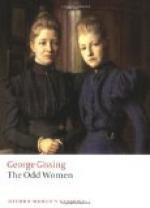’Really, I am not imaginative enough to put myself in such a position. It would need a stupendous effort, at all events.’
‘But was there anything gross in the proceeding?’
‘The lady took it ill?’
’Not in the sense of being offended. But she said it had caused her much suffering. She begged me to consider myself free. She would remain Faithful, and if, in time to come, I cared to write to her again—After all these years, I can’t speak of it without huskiness. It seemed to me that I had behaved more like a scoundrel than ever. I thought I had better kill myself, and even planned ways of doing it—I did indeed. But after all we decided that our engagement should continue.’
‘Of course.’
’You think it natural? Well, the engagement has continued till this day. A month ago I was forty, so that we have waited for seventeen years.’
Micklethwaite paused on a note of awe.
’Two of Fanny’s sisters are dead; they never married. The blind one Fanny has long supported, and she will come to live with us. Long, long ago we had both of us given up thought of marriage. I have never spoken to any one of the engagement; it was something too absurd, and also too sacred.’
The smile died from Everard’s face, and he sat in thought.
‘Now, when are you going to marry?’ cried Micklethwaite, with a revival of his cheerfulness.
‘Probably never.’
’Then I think you will neglect a grave duty. Yes. It is the duty of every man, who has sufficient means, to maintain a wife. The life of unmarried women is a wretched one; every man who is able ought to save one of them from that fate.’
’I should like my cousin Mary and her female friends to hear you talk in that way. They would overwhelm you with scorn.’
’Not sincere scorn, is my belief. Of course I have heard of that kind of woman. Tell me something about them.’
Barfoot was led on to a broad expression of his views.
’I admire your old-fashioned sentiment, Micklethwaite. It sits well on you, and you’re a fine fellow. But I have much more sympathy with the new idea that women should think Of marriage only as men do—I mean, not to grow up in the thought that they must marry or be blighted creatures. My own views are rather extreme, perhaps; strictly, I don’t believe in marriage at all. And I haven’t anything like the respect for women, as women, that you have. You belong to the Ruskin school; and I—well, perhaps my experience has been unusual, though I don’t think so. You know, by-the-bye, that my relatives consider me a blackguard?’
‘That affair you told me about some years ago?’
’Chiefly that. I have a good mind to tell you the true story; I didn’t care to at the time. I accepted the charge of black-guardism; it didn’t matter much. My cousin will never forgive me, though she has an air of friendliness once more. And I suspect she had told her friend Miss Nunn all about me. Perhaps to put Miss Nunn on her guard—Heaven knows!’




